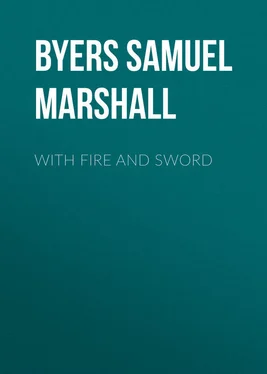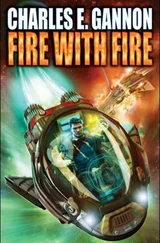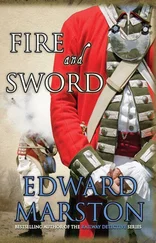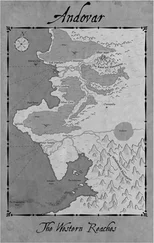Samuel Byers - With Fire and Sword
Здесь есть возможность читать онлайн «Samuel Byers - With Fire and Sword» — ознакомительный отрывок электронной книги совершенно бесплатно, а после прочтения отрывка купить полную версию. В некоторых случаях можно слушать аудио, скачать через торрент в формате fb2 и присутствует краткое содержание. Жанр: foreign_language, foreign_antique, foreign_prose, Историческая проза, на английском языке. Описание произведения, (предисловие) а так же отзывы посетителей доступны на портале библиотеки ЛибКат.
- Название:With Fire and Sword
- Автор:
- Жанр:
- Год:неизвестен
- ISBN:нет данных
- Рейтинг книги:3 / 5. Голосов: 1
-
Избранное:Добавить в избранное
- Отзывы:
-
Ваша оценка:
- 60
- 1
- 2
- 3
- 4
- 5
With Fire and Sword: краткое содержание, описание и аннотация
Предлагаем к чтению аннотацию, описание, краткое содержание или предисловие (зависит от того, что написал сам автор книги «With Fire and Sword»). Если вы не нашли необходимую информацию о книге — напишите в комментариях, мы постараемся отыскать её.
With Fire and Sword — читать онлайн ознакомительный отрывок
Ниже представлен текст книги, разбитый по страницам. Система сохранения места последней прочитанной страницы, позволяет с удобством читать онлайн бесплатно книгу «With Fire and Sword», без необходимости каждый раз заново искать на чём Вы остановились. Поставьте закладку, и сможете в любой момент перейти на страницу, на которой закончили чтение.
Интервал:
Закладка:
At just four in the evening our little steamer got the order to turn out of the river and into the rushing waters of the pass. We would not have been more excited at being told to start over Niagara Falls. Our engines are working backward and we enter the crevasse slowly, but in five minutes the fearful, eddying current seized us, and our boat was whirled round and round like a toy skiff in a washtub. We all held our breath as the steamer was hurled among floating logs and against overhanging trees. In ten minutes the rushing torrent had carried us, backward, down into the little lake. Not a soul of the five hundred on board the boat in this crazy ride was lost. Once in the lake we stopped, and with amazement watched other boats, crowded with soldiers, also drift into the whirl and be swept down the pass. It was luck, not management, that half the little army was not drowned.
Now for days and days our little fleet coursed its way toward Vicksburg among the plantations, swamps, woods, bayous, cane-brakes, creeks, and rivers of that inland sea. Wherever the water seemed deepest that was our course, but almost every hour projecting stumps and trees had to be sawn off under the water to allow our craft to get through. Sometimes we advanced only four or five miles a day. At night the boat would be tied to some tall sycamore. Here and there we landed at some plantation that seemed like an island in the flood. The negroes on the plantation, amazed at our coming, wondered if it was the day of Jubilee or if it was another Noah's flood and that these iron gunboats arks of safety.
We soldiers, if not on duty pushing the boat away from trees, had nothing to do but sleep and eat and read. Most of the soldiers slept on the decks, on the guards, and on the cabin floors. Four of us had a little stateroom. I had with me a copy of Shakespeare, cribbed by one of the boys somewhere, and the Bard of Avon was never studied under stranger circumstances.
The Yazoo Pass, though not so crazy as the crevasse we had come through, was nevertheless bad and dangerous. Two of our craft sank to the bottom, but the soldiers were saved by getting into trees. All the boats were torn half to pieces. One day as we pushed our way along the crooked streams amid the vine-covered forests we ran onto a Rebel fort built on a bit of dry land. In front of it were great rafts that completely obstructed our way. An ocean steamer was also sunk in the channel in front of us. To our amazement we learned that it was the Star of the West , the ship that received the first shot fired in the war of the Rebellion. That was when it was trying to take supplies to Fort Sumter. Our gunboats shelled this "Fort Greenwood" in vain, and now Rebels were gathering around and behind us and guerrillas were beginning to fire on the boats. The waters, too, might soon subside, and our fleet and army be unable to get back into the Mississippi. We could not go ahead. Suddenly the orders came to turn about and steam as fast as possible to a place of safety.
By April 8 we had made the journey through the woods and cane-brake back to the pass. The picturesque farce was ended. We could now hunt some other road to Vicksburg. We know nothing of what the generals thought of this fiasco, but we private soldiers had great fun, and the long stay on the boats had been a rest from hard campaigning. We had not lost a man. A whole campaign and not a soldier lost!
CHAPTER VI
The attempt on Vicksburg was not to be given up. In the spring of 1863 the whole army moved down the Mississippi to begin one of the most noted campaigns of history.
A real sane notion had gotten hold of Grant, and of scarcely anyone else. That notion was, if possible, to get across the Mississippi below the town (Sherman had failed trying it above) and throw the whole army on to the fortifications at the rear. If the town's defenders should be bold and come out and fight us, so much the better. We wanted that.
Soon General Grant built long stretches of wagon roads and corduroy bridges that ran snakelike for forty miles among the black swamps, cane-brakes, and lagoons on the west bank of the Mississippi River. He then marched half his army down these roads to a point below Vicksburg, below Grand Gulf, and bivouacked them on the shore of the river. The other half, of which my regiment was a part, remained near the river above the city. Possibly we were twenty-five thousand men there.
One night these twenty-five thousand bivouacked along the levees of the great river were all in great excitement. "Coming events were casting their shadows before."
It must have been some great event was about to happen that April night of 1863, for the Assistant Secretary of War was there, and General Grant and General Sherman were there, waiting and watching in the greatest suspense. What was going to happen? Some one hundred and fifty private soldiers were going to perform a deed that should help make American history. The success of a whole army and the capture of the best fortified city on the American continent depended on the heroism of this handful of private soldiers on this April night. No wonder the government at Washington sat by the telegraph and anxiously awaited every scrap of news sent from Grant's army before Vicksburg. He was to open the Mississippi River. That very day, almost, the government at Washington sent a letter urging General Grant to hurry. "In my opinion," telegraphed General Halleck for the President, " this is the most important operation of the war. To open the Mississippi River would be better than the capture of forty Richmonds. "
General Grant realized the mighty things he had at stake.
But what availed it to collect his soldiers there? In front of him, in high flood, swept the mightiest river on the continent; he had not a boat to cross with, and the enemy laughed and dared him from the other side. His fleet of steamboats was forty miles and more up the river, and between him and that fleet were four miles of hostile batteries strong enough to blow a fleet to pieces. In fact, every hill, hollow, and secret place above and below the city hid a dozen cannon. All the way from Vicksburg down to Warrentown was a fort.
What could be done? Without some steamers on which to cross, the game was blocked, and Vicksburg, strong as Sebastopol itself, might stand there forever and the Mississippi River be blockaded to the end of the war. Two or three of Grant's ironclad gunboats had run past these awful batteries one night, their sides banged to pieces and their iron mail scooped up as if it had been made of putty. One of them was sunk. But these iron tubs could not serve as ferryboats for forty thousand men. Then, the scheme was proposed to cover some of the wooden steamboats with cotton bales and on a dark night try and rush them past the batteries. The boat captains, however, would not risk it with their own crews, even had they as a rule been willing, and so the commands of the army asked for volunteers from the private soldiers. Desperate as the undertaking seemed, one hundred and fifty Union soldiers stepped forward and offered to run these steamboats past the guns. The writer was one of these volunteers. But too many had offered to take the risk. The required number was selected by lot, and the most I could do that historic night was to stand on the river levee in the dark and watch my comrades perform one of the most heroic acts of any war. It was hardly a secret. The whole army was excited over the desperate proposal. The enemy must have heard of it, and been doubly prepared to destroy us. "If Grant's attempt prove successful he can destroy the whole Confederate army, take Vicksburg, and open the Mississippi River." No wonder the Washington officials sat by the telegraph day and night just then awaiting great news.
Читать дальшеИнтервал:
Закладка:
Похожие книги на «With Fire and Sword»
Представляем Вашему вниманию похожие книги на «With Fire and Sword» списком для выбора. Мы отобрали схожую по названию и смыслу литературу в надежде предоставить читателям больше вариантов отыскать новые, интересные, ещё непрочитанные произведения.
Обсуждение, отзывы о книге «With Fire and Sword» и просто собственные мнения читателей. Оставьте ваши комментарии, напишите, что Вы думаете о произведении, его смысле или главных героях. Укажите что конкретно понравилось, а что нет, и почему Вы так считаете.












